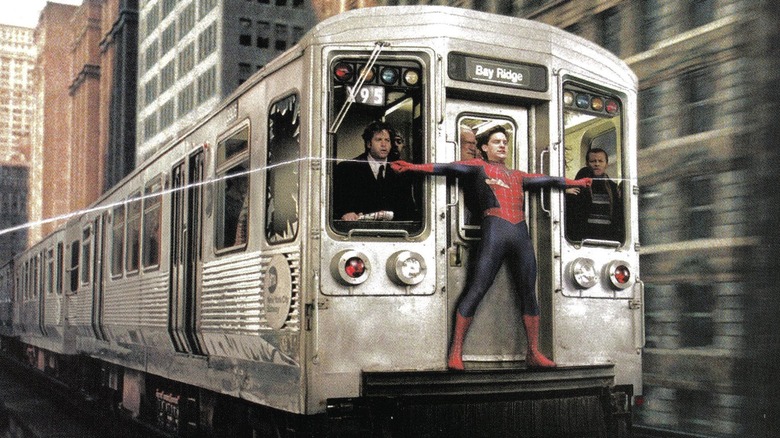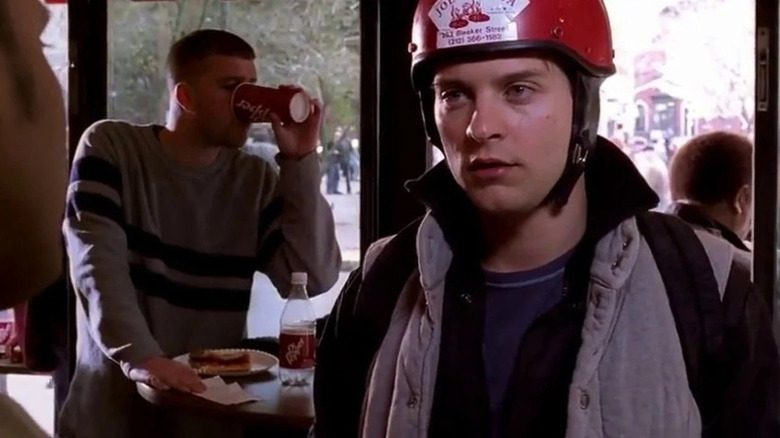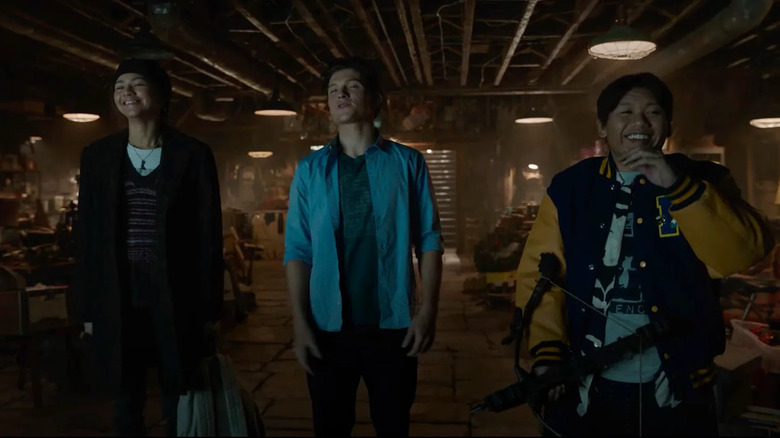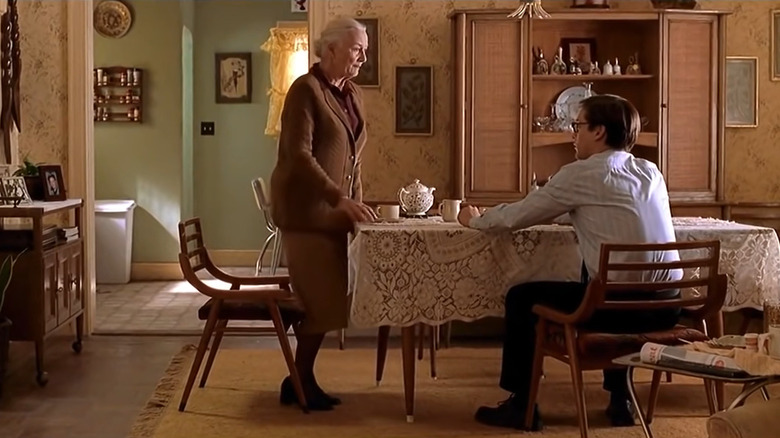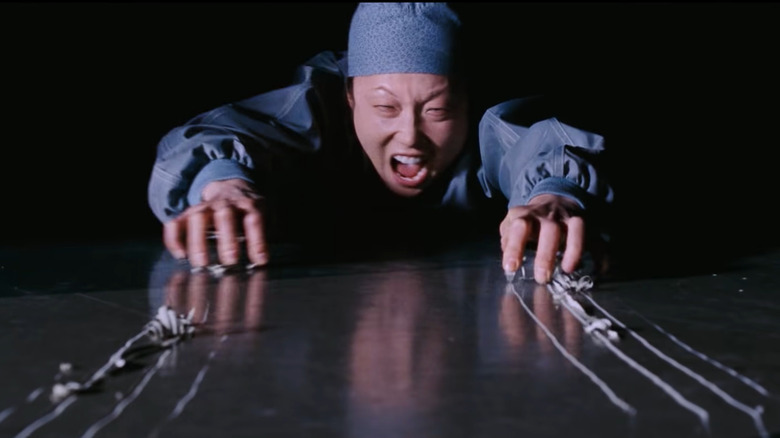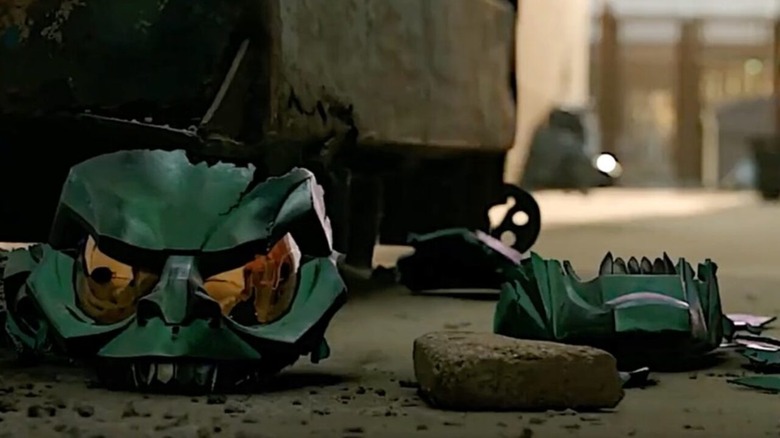More Superhero Movies Need To Take Lessons From Sam Raimi's Spider-Man
It's been 18 years since "Spider-Man 2" came out, which means it's been 18 years since the superhero genre hit its peak. Yes, "The Dark Knight" was cool and "Avengers: Endgame" was a satisfying conclusion to one of the most ambitious movie projects of all time, but "Spider-Man 2" is one of the most thrilling, emotional, and tightly focused superhero films ever made. Right behind it in quality is 2002's "Spider-Man," which proved definitively that Peter Parker was a character destined to live forever on the big screen. "Spider-Man 3" was also a movie.
Sam Raimi's trilogy has its critics, of course. People point out that these movies have a lot of goofy, hammy moments, like the Green Goblin using grenades that turn people into ugly CGI skeletons. They acknowledge that Kirsten Dunst's Mary Jane is relegated to a damsel-in-distress role in the climax of each movie, or that "Spider-Man 3" buckles under the weight of having too many villains.
All fair. But the movies still largely stand above most modern superhero films. Make fun of emo Peter Parker all you want, but there's a reason there are still so many people who insist this was the best live-action version of the character we've ever gotten to see. As the MCU goes deeper into its Phase Four, there are some lessons from the trilogy they should probably learn.
Knock it off with all the rich superheroes
While being rich is an unavoidable aspect of certain superheroes like Iron Man or Batman, it's a little frustrating how few main characters in the MCU have ever had to worry about money in any significant way. This is why Sam Wilson's arc in "The Falcon and the Winter" was kind of refreshing, even if it stretched credibility that an Avenger who fought Thanos would have legitimate trouble taking out a loan. For the most part, everyone else in the modern MCU is well-off financially, even before they became an Avenger.
Even if they're meant to be seen as poor or working class, the new movies never actually take that part of their lives seriously. Tom Holland's Peter Parker may call himself broke in "No Way Home," but never at that point in the trilogy had money ever been a real concern for him in a way that meaningfully affected the plot. This Peter goes to a fancy school and is given all his crime-fighting equipment from a billionaire. In Sam Raimi's "Spider-Man" trilogy, rich characters like Norman Osbourne (Willem Dafoe) and Otto Octavius (Alfred Molina) are corrupted early on by their wealth and power, whereas Tony Stark is a clear-cut good role model in "Iron Man." Raimi has Spider-Man fighting the rich, not fighting for them.
The thing that sets Raimi's Peter Parker apart from the MCU's Peter is we actually see him struggle in a relatable way. "Spider-Man" opens with Uncle Ben getting laid off and the family preparing for tough times ahead, and it depicts Mary Jane as coming from a broken home and working as a waitress to make ends meet. "Spider-Man 2" sees Peter juggling two jobs on top of school and his crime-fighting duties, and it quickly becomes overwhelming. Not only is Raimi's Peter more sympathetic than anyone else in the modern MCU; he's also more relatable to audiences. There are way more overworked, financially struggling people out there than there are billionaires, or people getting mentored by billionaires.
Easy on the jokes
When the trailer for "No Way Home" came out last year, one moment drew some criticism despite the overall excitement fans were feeling. Octavius tells Peter (Tom Holland), MJ (Zendaya) and Ned (Jacob Batalon) his full name, and the three teens start cracking up. "No, seriously," says Peter. "What's your actual name?"
IGN tweeted out a theater reaction clip to the trailer, and the fans — who cheered and hollered throughout the whole thing — were dead silent during this moment. It was a weirdly self-conscious joke, meant to address a nit-picky criticism few fans actually had. It was the movie telling its audience in a wink-wink kind of way, "Yes, we too know this is stupid." But fans didn't need the movie to address how strange Otto's name is to suspend their disbelief. This is a comic book movie, and it's hardly the weirdest thing we've seen on screen before.
That the trailer editors kept the joke in, even as it clearly hurt the trailer's pacing, gives us an idea of what Marvel prioritizes creatively. Throughout most of the MCU, the movies have a clear need to distance themselves not just from anything deemed too weird, but from anything too earnest. Gone is the genuine, uncompromised emotion behind every scene in Raimi's "Spider-Man" trilogy. Instead we have the flight attendant interrupting the main character's tragic backstory monologue to ask if they want the beef or vegetarian meal option. Anything to avoid having to linger in a serious moment.
The video essayist channel Just Write describes the type of humor in modern Marvel movies as "bathos," an old literary term for when a text "suddenly switches from serious to trivial for comedic effect." New superhero movies are full of this. Any genuine emotion is undermined by a cheap joke, supporting the feeling that none of what's happening really matters.
Don't be embarrassed to be genuine
The movies use constant sarcasm and cynicism, seemingly to avoid the possibility of ever being laughed at by the audience instead of being laughed with. They want to avoid the meme of Peter ugly-crying at the end of "Spider-Man 3," and as a result they miss out on scenes like Peter telling Aunt May the truth about Uncle Ben's death in "Spider-Man 2." A scene like that is impossible to imagine in a modern superhero film, because it's real and because the tension is never diffused. Aunt May is hurt by what Peter says and she leaves the room without giving him closure, and the movie is comfortable lingering in that, making you feel the guilt and uncertainty along with Peter.
It's somewhat understandable why the MCU has taken this turn. In the backlash to DC's super dark and serious era throughout the late 2000s and 2010s, the MCU's willingness to not take itself too seriously felt, for a little while at least, like a breath of fresh air. But by the time we got to the airport scene in "Civil War" where our heroes are making constant quips in the middle of a supposedly important battle, it was clear the MCU had gone too far in the other direction.
But even for the early 2000s, Raimi's Spider-Man was uniquely earnest. The "X-Men" films released around the same time still felt the need to include jokes dismissing the source material ("What would you prefer, yellow spandex?"), whereas the "Spider-Man" trilogy was rarely scared to embrace its comic book roots as well as focus on Peter's character arc outside of the superhero fight scenes. The amount of time dedicated to Peter's attempts to find a work/life balance in "Spider-Man 2" is unprecedented by today's standards, but it's part of why the movie is still so beloved, even by people with superhero fatigue. As Just Write put it: "We need stories to take risks in the emotions that they portray and not second-guess themselves with winks to the audience."
Get scary again
Sam Raimi gets made fun of a lot for his love of having women scream in his films, and that's fair. The original "Spider-Man" trilogy had more than enough of screaming women to go around. But what's missing from the critique is the acknowledgement that Raimi is, at his core, a horror director. He's the guy behind movies like "Drag Me to Hell" and "The Evil Dead," and that's hard to forget in plenty of moments of these movies.
Take the hospital scene in "Spider-Man 2," where a team full of doctors are brutally murdered by Doc Ock's mechanical arms. It's filled with brutal deaths, screaming women, and one woman in particular clawing the floor with her nails while being dragged away. It's effectively disturbing. The trilogy is filled with moments like these. From Gwen Stacy (Bryce Dallas Howard) getting attacked by a malfunctioning crane to Eddie Brock (Topher Grace) being possessed by Venom and Aunt May's absurd jump scare in "Spider-Man" (that might've been too much), these movies aren't afraid to frighten you.
Even when it's not full-on horror, it's surprising on rewatch just how hard the fight scenes in these movies go. Maybe it has more to do with the use of practical effects over CGI, but Green Goblin's final fight with Peter is way more intense than pretty much anything in the MCU. The train sequence in "Spider-Man 2" is also pretty vicious, and it's somehow still more visually impressive than most of the MCU's modern fight scenes.
One of the reasons "The Batman" was so refreshing is it's the first well-done comic book movie in a while to not shy away from moments of true horror. The Riddler in this movie is genuinely unnerving, and the film never hesitates to let Paul Dano get under the audience's skin. The MCU could benefit from letting some of its films follow more in the steps of "The Batman" here.
Promising signs for the MCU
The good news for anyone hoping for a return to the tone of the Raimi trilogy is the MCU does seem to be bringing back some of those elements. Not only did they hire Sam Raimi to direct the new "Doctor Strange" movie, but "No Way Home" also featured a return to a more grounded, working-class version of Peter Parker.
By the end of "No Way Home," Peter no longer has an aunt or uncle looking after him. He's living alone, with no friends or family, and no longer getting any support from the Avengers. While there's certainly a chance Marvel takes the easy way out and has Peter reunite with MJ and Ned in the next film, hopefully they choose to give Peter a movie or two where he genuinely does have to deal with real-world problems like paying for rent and figuring out a way to get through college with no financial support.
While the movie featured its typical moments of bathos, it was comparatively way more restrained than usual, more willing to allow a sad moment to play out in full. It also showed signs of the MCU reintroducing horror elements back into their movies; the scene in "No Way Home" where Peter's spider sense goes off and he's trying to figure out the source is genuinely unnerving. Maybe that was just a one-off side effect of the Raimi trilogy characters playing major roles in the movie, or maybe this is a hopeful sign of things to come.
